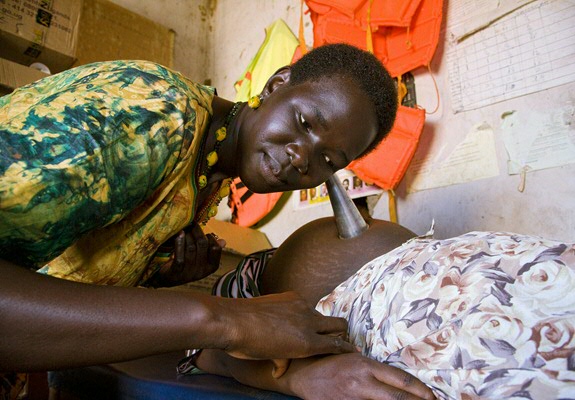Waardoor krijgen we meer of minder kinderen?

Hilde Bras is een van de nieuwe Aletta Jacobs-hoogleraren aan de RUG. Ze gaat op zoek naar verklaringen voor demografische ontwikkelingen. Familierelaties blijken daarbij van grote invloed te zijn.
Door Martin Althof, afd. Communicatie RUG
Hoe zou je de wetenschapper Hilde Bras willen typeren?
Ik zie mezelf als een echte interdisciplinair wetenschapper, werkzaam op het snijvlak van geschiedenis, sociologie en demografie. Ik ben gespecialiseerd in “social science history”, dat theorieën en methoden uit de sociale wetenschappen gebruikt in onderzoek naar het verleden. Mijn Aletta Jacobs leerstoel Economische en Sociale Geschiedenis, met bijzondere aandacht voor Mondiale Demografie en Gezondheid, richt zich op de mondiale geschiedenis van bevolking en gezondheid, gedurende de laatste 200 jaar. De veranderende ongelijkheden op het gebied van gezondheid, sterfte, kindertal, migratie, en gezinsvorming, tussen individuen en groepen, staan daarbij centraal.
Wat zijn de komende jaren je belangrijkste aandachtspunten van onderzoek?
In de afgelopen 150 jaar hebben zich enorme demografische verschuivingen voorgedaan, denk in de “Global North” onder andere aan vergrijzing, bevolkingskrimp, toegenomen echtscheiding, samengestelde gezinnen en kinderloosheid. In de “Global South” zijn de sterftekansen sterk gedaald en is de gezondheid verbeterd, maar is het kindertal in sommige landen en sociale groepen nog hoog (met name in sub-Sahara Afrika), waardoor de bevolking daar nog sterk groeit. Veel van die veranderingen hebben hun wortels in het verleden, in postkoloniale, koloniale maar ook pre-koloniale perioden. Door een langetermijnperspectief te hanteren zijn hedendaagse ontwikkelingen en ongelijkheden beter te plaatsen en te begrijpen.
Bevolkingsontwikkelingen in sub-Sahara Afrika hebben je bijzondere interesse. Waarom?
Voorspellingen van de Verenigde Naties laten zien dat er in 2100 4,4 miljard mensen in Afrika wonen. Als dat uitkomt is dat een verdertigvoudiging van de bevolking in 200 jaar tijd. Wat zijn de historische wortels van die enorme bevolkingsgroei vanaf de jaren 50? En van het in veel landen uitblijven of stagneren van de derde fase van de demografische transitie, waarbij ook het kindertal daalt. In hoeverre heeft koloniale ‘modernisering’ van bijvoorbeeld de gezondheidszorg en het onderwijs ervoor gezorgd dat de sterfte (met name moedersterfte en kindersterfte) daalde en in hoeverre werden vrouwen gestimuleerd om meer kinderen te krijgen? Welke pre-koloniale regionale verschillen in seksualiteit en vruchtbaarheid waren er en hoe veranderden die onder invloed van de koloniale overheersing? Daarnaast wil ik kijken in hoeverre genderongelijkheid de vertraagde daling van het kindertal in dit gebied kan verklaren. Uit onderzoek in Europa en Azië weten we dat het opleidingsniveau van vrouwen een goede voorspeller is van de daling van het kindertal.

Je leidde het Vidi-project ‘De kracht van de familie, invloed van familie op de langetermijndaling van de vruchtbaarheid in Europa, 1850 – 2010’. Waarom is dit onderzoek zo relevant?
Sinds 1850 is het kindertal in gezinnen in de meeste Europese landen sterk gedaald. Daar zijn verschillende verklaringen voor geopperd. Zo zou het door de Industriële Revolutie komen. Die maakte onderwijs belangrijk voor het arbeidsproces, maar onderwijs kost geld. Kinderen werden dan ook duurder, zodat veel ouders voor minder kinderen kozen. Een andere verklaring heeft te maken met secularisering en individualisering waardoor gezinnen kleiner werden. Maar die theorieën verklaren niet de regionale spreiding in de daling van het kindertal. Wij hebben gekeken naar de invloed van familierelaties. Familierelaties en de rol van verwanten en niet-verwanten verschillen sterk tussen regio’s. Zo wijst het onderzoek in historisch Nederland (1870-1940) op de centrale rol van vrouwen (en de familierelaties van vrouwen) in onderhandelingsprocessen rond voortplanting binnen huishoudens. Factoren die daarbij een rol spelen zijn de beschikbaarheid van economische middelen en de behoefte aan te verlenen zorg binnen de familie. Maar in Oekraïne (jaren 1950 en 1960) werd de toetreding tot het ouderschap bepaald door de sociale druk van ouders (en schoonouders) van wie koppels verwachtten financiële en zorgondersteuning te ontvangen.
Wat kan Europa hiervan leren?
Bevindingen verschillen per regio. Toekomstige demografische veranderingen, maar ook gedrag op het gebied van gezondheid (bijvoorbeeld de verspreiding en omgang met COVID-19) hangen deels samen met de waarden, normen en praktijken rond familierelaties in historisch gegroeide, geografisch verankerde familiesystemen. Beleid zou meer rekening kunnen houden met deze onderliggende waardesystemen.
Wat kun je zeggen over de situatie in Nederland?
Nederland had in Europees perspectief een relatief late vruchtbaarheidsdaling, pas vanaf het eind van de negentiende eeuw. In vrijwel heel Nederland is de vruchtbaarheid nu gedaald tot onder het vervangingsniveau. Er zijn nog wel gebieden en groepen waar wat grotere gezinnen voorkomen, zoals in plaatsen op de Biblebelt, veelal gereformeerd en met traditionele familiewaarden. Bijvoorbeeld op Urk waar 44 % van de moeders 4 of meer kinderen heeft. Rond 1950 was het aantal geboorten per duizend inwoners in Noord-Brabant en Limburg ongeveer een kwart hoger dan in Groningen en Friesland. Inmiddels is er van zo’n noord-zuid patroon geen sprake meer, Limburg en Groningen zijn de minst vruchtbare provincies. Flevoland, Drenthe, Friesland en Overijssel zijn nu de provincies met een hogere vruchtbaarheid. Flevoland is de provincie met het grootste aandeel jongeren. Dat komt niet alleen door geboorten maar ook door migratie. Sommige plaatsen zijn, vaak door het beschikbaar zijn van woningen, aantrekkelijk voor jonge gezinnen.
Is er iets te zeggen over de ontwikkeling van de vruchtbaarheid in Nederland in de komende 30 jaar?
Of de vruchtbaarheid weer gaat stijgen (zoals nu in sommige Scandinavische landen) heeft sterk te maken met het niveau van voorzieningen (kinderopvang, ouderschapsverlof etc.). De toekomstige rol van de vader (van het kind) is hierbij van belang. In hoeverre heeft hij de mogelijkheden om voor het kind te zorgen en is er sprake van een meer gelijke verdeling van werk en zorg binnen stellen? En in hoeverre is een zorgende vader ook sociaal gezien normaal? Ook grootouders zijn een factor van belang, ze zijn vaker langer vitaal en kunnen daardoor een rol spelen bij de opvang van kleinkinderen.
Kunnen de onderzoeksresultaten van belang zijn voor beleidmakers in Nederland?
Onze resultaten geven aan dat een relationeel perspectief nodig is waarin met name familierelaties en -invloeden centraal staan, om kwesties van vruchtbaarheidsdaling en vergrijzing in Europese samenlevingen te reguleren. Bovendien volgt uit onze resultaten dat dergelijk beleid contextspecifiek moet zijn, aangezien familieinvloeden sterk variëren tussen regio's. Beleid zou beter rekening moeten houden met en inspelen op al lang bestaande normen en waarden en praktijken met betrekking tot (de rol van) van familie en verwanten.
Meer informatie
Meer nieuws
-
19 januari 2026
Digitalisering drijft kansarme burgers soms in het nauw
-
13 januari 2026
Het goede doen in complexe situaties
